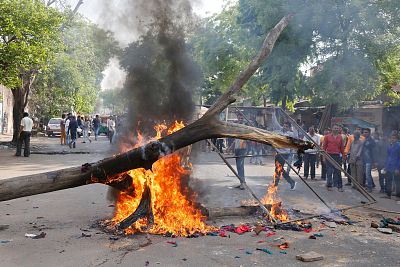Unrest took hold of several parts of northern and central India on Monday as thousands of dalits, members of Hinduism's lowest caste, protested an order from the country's top court.
NEW DELHI — Unrest took hold of several parts of northern and central India on Monday as thousands of dalits, members of Hinduism's lowest caste, protested an order from the country's top court that they say dilutes legal safeguards put in place for their marginalized community.
Caste prejudice is endemic in Hindu-majority India, even though the constitution outlaws the practice and has made it a crime punishable by up to a year in prison.
The law also states that anyone accused of a caste-related crime could face immediate arrest. However, last month the Supreme Court ruled that in order to prevent misuse of the law, government officers accused of flouting it can be arrested only after their supervisors sign off on an inquiry.
Dalit groups say that the law is already poorly enforced with abysmally low conviction rates and that the top court's order dilutes it further. Several groups called for a nationwide protest on Monday demanding that the top court review its order.
As protests spread across the states of Punjab, Haryana, Uttar Pradesh and Madhya Pradesh, India's law minister, Ravi Shankar Prasad, told reporters that the federal government would petition the court seeking a review.
The dalits are lowest in Hinduism's caste hierarchy and for centuries were marginalized and forced to perform only certain jobs considered menial by other castes. These included skinning dead animal carcasses and cleaning toilets. They were not allowed into temples or permitted to study religious texts.
Independent India's constitution, which came into effect in 1950, outlawed the practice of discriminating on the basis of caste. Over the years, stringent laws were put into place to deter the practice. But caste-based discrimination continues even though it's less visible in modern India.
Last week, news reports said a dalit man was hacked to death by upper caste villagers because he owned and rode a horse, long considered a status symbol in rural India. Dalit schoolchildren routinely complain of being mistreated in schools and colleges.












